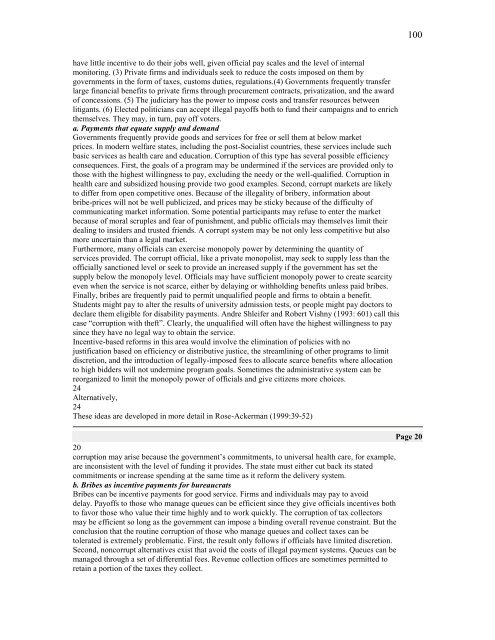FILSAFAT KORUPSI - Direktori File UPI
FILSAFAT KORUPSI - Direktori File UPI
FILSAFAT KORUPSI - Direktori File UPI
You also want an ePaper? Increase the reach of your titles
YUMPU automatically turns print PDFs into web optimized ePapers that Google loves.
have little incentive to do their jobs well, given official pay scales and the level of internal<br />
monitoring. (3) Private firms and individuals seek to reduce the costs imposed on them by<br />
governments in the form of taxes, customs duties, regulations.(4) Governments frequently transfer<br />
large financial benefits to private firms through procurement contracts, privatization, and the award<br />
of concessions. (5) The judiciary has the power to impose costs and transfer resources between<br />
litigants. (6) Elected politicians can accept illegal payoffs both to fund their campaigns and to enrich<br />
themselves. They may, in turn, pay off voters.<br />
a. Payments that equate supply and demand<br />
Governments frequently provide goods and services for free or sell them at below market<br />
prices. In modern welfare states, including the post-Socialist countries, these services include such<br />
basic services as health care and education. Corruption of this type has several possible efficiency<br />
consequences. First, the goals of a program may be undermined if the services are provided only to<br />
those with the highest willingness to pay, excluding the needy or the well-qualified. Corruption in<br />
health care and subsidized housing provide two good examples. Second, corrupt markets are likely<br />
to differ from open competitive ones. Because of the illegality of bribery, information about<br />
bribe-prices will not be well publicized, and prices may be sticky because of the difficulty of<br />
communicating market information. Some potential participants may refuse to enter the market<br />
because of moral scruples and fear of punishment, and public officials may themselves limit their<br />
dealing to insiders and trusted friends. A corrupt system may be not only less competitive but also<br />
more uncertain than a legal market.<br />
Furthermore, many officials can exercise monopoly power by determining the quantity of<br />
services provided. The corrupt official, like a private monopolist, may seek to supply less than the<br />
officially sanctioned level or seek to provide an increased supply if the government has set the<br />
supply below the monopoly level. Officials may have sufficient monopoly power to create scarcity<br />
even when the service is not scarce, either by delaying or withholding benefits unless paid bribes.<br />
Finally, bribes are frequently paid to permit unqualified people and firms to obtain a benefit.<br />
Students might pay to alter the results of university admission tests, or people might pay doctors to<br />
declare them eligible for disability payments. Andre Shleifer and Robert Vishny (1993: 601) call this<br />
case ―corruption with theft‖. Clearly, the unqualified will often have the highest willingness to pay<br />
since they have no legal way to obtain the service.<br />
Incentive-based reforms in this area would involve the elimination of policies with no<br />
justification based on efficiency or distributive justice, the streamlining of other programs to limit<br />
discretion, and the introduction of legally-imposed fees to allocate scarce benefits where allocation<br />
to high bidders will not undermine program goals. Sometimes the administrative system can be<br />
reorganized to limit the monopoly power of officials and give citizens more choices.<br />
24<br />
Alternatively,<br />
24<br />
These ideas are developed in more detail in Rose-Ackerman (1999:39-52)<br />
100<br />
Page 20<br />
20<br />
corruption may arise because the government‘s commitments, to universal health care, for example,<br />
are inconsistent with the level of funding it provides. The state must either cut back its stated<br />
commitments or increase spending at the same time as it reform the delivery system.<br />
b. Bribes as incentive payments for bureaucrats<br />
Bribes can be incentive payments for good service. Firms and individuals may pay to avoid<br />
delay. Payoffs to those who manage queues can be efficient since they give officials incentives both<br />
to favor those who value their time highly and to work quickly. The corruption of tax collectors<br />
may be efficient so long as the government can impose a binding overall revenue constraint. But the<br />
conclusion that the routine corruption of those who manage queues and collect taxes can be<br />
tolerated is extremely problematic. First, the result only follows if officials have limited discretion.<br />
Second, noncorrupt alternatives exist that avoid the costs of illegal payment systems. Queues can be<br />
managed through a set of differential fees. Revenue collection offices are sometimes permitted to<br />
retain a portion of the taxes they collect.

















